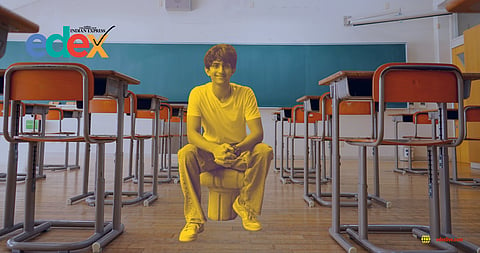

I am glad that we are living in times where conversations on mental wellbeing are more centrestage than ever before, but is this enough?
Mental Health may sometimes feel like an overused word, but trust me, it deserves all the attention it is drawing and more.
Fact: We children feel anxious. Overstimulated. Disconnected. In a country like India, where every average child is usually brilliant, we’re constantly chasing personal goals and competing every day, while also trying to balance ambition and burnout, all this while our brains are still developing.
I come from a home where wellness is not just a word, but a source of livelihood - this meant that values of self-love and well-being timeouts were a part and parcel of growing up. Luckily, I knew I had a support system both at home and school, which has helped me stay in the safe lane.
Even in a school that prioritises wellness, as headboy, I witnessed troubling patterns in some of my juniors when I saw them succumbing to peer pressure, subtle ostracisation, online smear campaigns, and, most heartbreaking of all, students losing that natural joy that should define our teenage years. I knew I could and must do more than just observe.
This was when the idea of the wellness council came to me. I founded this student-led movement that conducted fun social-emotional learning experiences through positive mental health activities. These classroom sessions became a safe place where children participated in real-time, mood-boosting cognitive behavioural workshops that built camaraderie, self-confidence, endorphins, and resilience! The wellness council was gathering faith and followers.
Every week, I, along with my co-members, would carry multiple props into the middle years classrooms, where the juniors would welcome us with squeals and cheers! These wellbeing brain break rituals were becoming weekly pats on their backs. Through creative modules and sessions ranging from “safe spaces to share feelings”, “dance like no one’s watching”, “meditate to motivate”, “post-power of a compliment”, “Let's Toast, not Roast”, etc, the council engaged over 500 students from Grades 1 to 8 in meaningful, consistent wellness practices. These built empathy, teamwork, and positive behaviour, cumulatively contributing to the school spirit.
This, by the students-for the students’ pilot run of the wellness council, became such a hit that I decided it was time to take this outside, to schools and children who perhaps needed this more than us.
I call it the ‘wellness whisperer’ movement, because the body whispers before it screams. And as ‘whisperers of wellness’, we must all learn to listen to whispers early on, before they turn into a scream for help.
Next stop, I met up with Mr Santosh Tayade (Block Education Officer who looks into 10+ schools in the region) and Mr Kisan Gore (Founder of the Shree Vinzai Devi High School in Mulshi, which provides education to 200+ children in the Taluka). I took them and some senior students through the ‘wellness whisperer’ concept, sharing with them how we could help schools like theirs also initiate student-led wellness councils in their schools. Naturally, the litmus test for us came as we ran sessions there to show them exactly how instantly effective these workshops were.
The mental upliftment was ours to experience. In one of the ‘share gratitude’ activities, the impeccably behaved children’s profound answers ranged from grateful for being able to see, read, think, and speak, to the profoundly personal - grateful for loving parents, having a home. I started feeling grateful as they warmed up with smiles!
In another activity, they clapped and cheered for peers who answered bravely. They shared personal stories of achievement, of pride, of fear, and made the whole workshop feel like a bubbled safe zone… I knew this here was exactly what the wellness council stood for - making mental health a classroom priority.
Yet again, the most grateful ones in the room were us.
In these schools by the hills, we were able to go deeper. What began in classrooms was entering habits and diverse personal lives.
The movement continues. I feel truly blessed to watch this wellness initiative grow in strength and its ability to heal. True wellness begins not with noise but with quiet, consistent care. I hope you feel inspired to join me in this movement.
[Written by Kiyan Kapur. Views expressed are their own]
